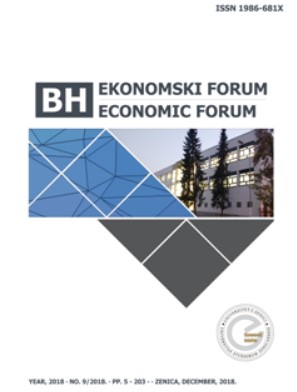DOES THE OLIGOPOLISTIC POSITION OF BANKS AFFECT THE PERFORMANCE OF THE BANKING SECTOR IN THE FEDERATION OF BOSNIA AND HERZEGOVINA?
DOES THE OLIGOPOLISTIC POSITION OF BANKS AFFECT THE PERFORMANCE OF THE BANKING SECTOR IN THE FEDERATION OF BOSNIA AND HERZEGOVINA?
Author(s): Almir AlihodžićSubject(s): Business Economy / Management, Financial Markets, Accounting - Business Administration
Published by: Ekonomski fakultet - Univerzitet u Zenici
Keywords: Performance; privatization; concentration; banks in Federation of B&H;
Summary/Abstract: The level of banking concentration has increased significantly in the banking sector of Bosnia and Herzegovina as a result of the successful completion of privatization, the formation of new banks, the slow transition and rapid liberalization. Rapid liberalization has introduced strong competition in the domestic banking sector on the one hand, while there has been an increased concentration of some larger banks in the system. The main goal of this research will be to analyze the correlation between the basic measures of the oligopolistic position of banks and their impact on improving or deteriorating the performance of domestic banks, such as return on assets (ROA), return on equity (ROE) and net interest margin (NIM). The survey period covers the years from 2008: Q1 to 2020: Q4 on a quarterly basis. The following variables were used as independent variables in the model: HHI market concentration index in the context of loans, share of foreign banks in the total ownership structure of banks (FB), bank size (BS) and growth rate of total loans (GRTL).The interdependence of variables in this study was tested via the OLS regression model. The results showed that the foreign-owned Banks (FB) variable has a positive impact on the variable return on Assets (ROA), while the variables bank size (BS) and market concentration index for loans (HHI) have a negative impact. The result also showed that the two variables the growth rate of total loans (GRTL) as well as foreign-owned banks (FB) have a positive impact on the variable return on equity (ROE), while the variables market concentration index for loans (HHI) and bank size (BS) have a negative effect. The third result is that the variable net interest margin (NIM) has the strongest positive impact on the two variables foreign-owned banks (FB) and credit growth rate (GRTL), while concentrations for credit placements (HHI) and bank size (BS) have a negative effect.
Journal: BH ekonomski forum
- Issue Year: 2021
- Issue No: 13
- Page Range: 113-131
- Page Count: 19
- Language: English

